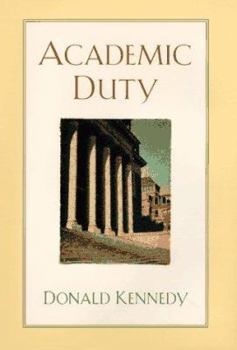Academic Duty
Select Format
Select Condition 
Book Overview
The university is under attack from all sides. Parents and students resent the escalating costs of education and wonder where the money is being spent. Aspiring scholars feel betrayed by an institution that prepares them for nonexistent jobs. Critics on the right condemn teachers who negelect the canon while critics on the left condemn the creeping corporatism on campus. Politicians seek greater control over the conduct of research and add new conditions...
Format:Hardcover
Language:English
ISBN:0674002229
ISBN13:9780674002227
Release Date:October 1997
Publisher:Harvard University Press
Length:310 Pages
Weight:1.10 lbs.
Dimensions:1.1" x 6.5" x 9.6"
Customer Reviews
4 ratings
Highly Appreciated
Published by Thriftbooks.com User , 18 years ago
I've read this great work for many times. In Taiwan, there are too much fascinating heritage from US education and some unethical stuff, too. Although it seems to be a little unorganized, that's the ways of conducting academic research and nature of science. After all, Dr. Kennedy did write something insightful and helpful and, somewhat practical. Read it and know the academic community. I would say: "salvation lies within." I would like to see more revisory supplements and concurrent issues like Dr. Kennedy's works.
Institutional, Academic, Personal Duties
Published by Thriftbooks.com User , 21 years ago
As an academic aspirant, I read this book with diligence and thoroughness. Twice. Donald Kennedy has an impressive academic achievement as an environmental scientist, along with institutional leadership experience as former President of Stanford University. In this book-inspired by a conviction of the need for academic aspirants to know the true workings of the academia- various duties of members of the academia are elaborated and modern day issues facing the universities are dissected. However, after reading the book twice, as excited as I was with the book, there were some deficiencies. Traditionally, the roles of a professor in a university have been to teach and to research, with different emphasis on the two roles, in different universities. With this as an accepted view, Kennedy further breaks down the roles of the academic into mentoring, institutional service, publishing, as symbols of truthfulness and perhaps, closest to his heart, as agents of change. In the 303 pages, Kennedy warns the current and the future members of the need to balance academic duty with academic freedom. With no implicit arguments, he stressed the need to re-focus on undergraduate teaching, a central role of universities. The members of the academia are not only teachers but also mentors and influential role models of the students in institutions of higher learning. He also questions the current style and intensity of producing Phd students, the majority of whom make up the future professoriate. Kennedy exposes truths about the over-production of PhD students; the subsequent failure of many to break into the academia; the lack of teaching training for those who eventually become young professors. What is personally the most exciting discussion was without doubt the one on research, research misconduct and the pursuit of truth. Kennedy carefully elaborates examples of the difficulty of research with appropriate stories of fictional but realistic characters. However, as a student of social sciences, I was nonetheless disappointed that many of the examples were in the field of sciences and there was no significant discussion of the field of social sciences or humanities. Added to that, there were hardly any examples of Kennedy's own experiences in research. Perhaps, the author thought that any personal experiences were materials insufficient to demonstrate the arguments or that he was uncomfortable in using his own experiences as examples. Either way, I felt that lessons of his own research experiences would have been very enlightening.However, this short book has powerful insights and lessons for the future members of the academia, not excepting me. Somehow, after reading this book, I understand the fallacy of the ivory tower. Much of the universities' world, as a scholarly enterprise, lofty in their pursuit of truths and free of political man-handling, has changed into an institution under public scrutiny and subjected to public accountability. This book has insp
A must read for entering doctoral students, too!
Published by Thriftbooks.com User , 23 years ago
Great book. Not only should all assistant professors read it, but it should be required reading for all new doctoral students no matter what discipline. It illuminates the way universities actually work and details common pitfalls into which people entering the profession (academe and the professoriate)can fall. In addition, the reader is given an insider's look into one of the major research universities in the world (Stanford). It has the bonus of being extremely well written and a pleasure to read. Again, great book.
Great book!
Published by Thriftbooks.com User , 26 years ago
An outstanding antidote to misinformed university bashing. All new assistant professors should read this book. It gives excellent advice and insights into the inner workings of the university.





